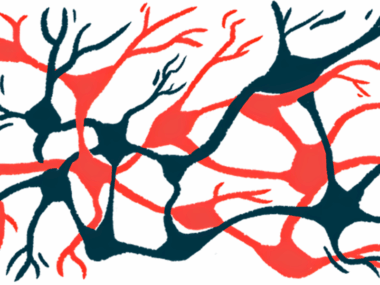Inflammatory Gut Bacteria, Genes May Be Parkinson’s Biomarkers
Study suggests people in different regions may share common microbiome characteristics
Written by |

Certain pro-inflammatory gut bacteria, genes, and pathways are significantly increased in people with Parkinson’s disease compared with healthy people, while anti-inflammatory ones are significantly reduced, a large study found.
Also, machine learning models based on 11 of these bacteria and six of these genes accurately discriminated between people with and without Parkinson’s, further suggesting these factors could serve as potential biomarkers of the neurodegenerative disease.
“Our results provided further insights into the prediction and treatment of PD [Parkinson’s disease] based on inflammation,” the researchers wrote about their study, “Inflammatory microbes and genes as potential biomarkers of Parkinson’s disease,” which was published in Biofilms and Microbiomes.
The gut microbiota refers to the vast community of friendly bacteria, fungi, and viruses that colonize the gastrointestinal tract. While this community helps to maintain a balanced gut function, gut microbiota imbalance, or gut dysbiosis, can promote inflammation and trigger or worsen certain health conditions. This imbalance has been suggested to sow the gut with toxic clumps of the alpha-synuclein protein before they migrate into the brain, where they contribute to neurodegeneration, a hallmark of Parkinson’s.
Evidence for a crosstalk between the gut and the brain across the so-called gut-brain axis is placing the gut microbiota at the center of the many possible causes behind Parkinson’s.
Researchers in China hypothesized that people with Parkinson’s “in different countries and regions share common microbial and metabolic characteristics,” they wrote. To test their hypothesis, they drew on data from people across seven countries.
Nine datasets containing 2,269 samples (1,373 from Parkinson’s patients and 896 from healthy people) were analyzed with 16S rRNA sequencing, a technique that allows microbial species to be identified.
Also, two other datasets of 236 samples (122 from Parkinson’s patients and 114 from healthy people) were assessed through shotgun metagenomic sequencing, which allows the study of all genes in all organisms present in a given complex sample.
Differences between Parkinson’s, healthy gut bacteria
Results showed the relative abundance of 23 different groups (genera) of bacteria differed significantly between healthy people and those with Parkinson’s.
Among these, there were five genera of potential pro-inflammatory bacteria (Streptococcus, Bifidobacterium, Lactobacillus, Akkermansia, and Desulfovibrio) that were significantly more abundant in Parkinson’s samples across countries than in healthy people.
Five other genera of bacteria (Roseburia, Faecalibacterium, Blautia, Lachnospira, and Prevotella), which are reported as potential anti-inflammatory, were significantly less abundant in Parkinson’s samples.
A previous study found a similar imbalance in the gut microbiome of people with Parkinson’s.
When comparing the gut microbiota network structure between people with and without Parkinson’s, the researchers found that Prevotella were only present in the network of healthy people.
“Therefore, metabolic pathways related to inflammatory metabolism and the [10] potential inflammation-related genera mentioned above were further analyzed,” the they wrote.
The researchers focused on genes involved in four metabolic pathways associated with gut inflammation: short-chain fatty acids (SCFAs), which have anti-inflammatory properties, and lipopolysaccharides, hydrogen sulfide, and glutamate — three types of inflammatory molecules previously linked to Parkinson’s.
A total of 63 of these genes showed significant differences in their activity between people with and without Parkinson’s. Among them, 19 genes related to short-chain fatty acid pathways were tuned down in people with Parkinson’s versus healthy people. All 26 genes related to lipopolysaccharide, hydrogen sulfide, and glutamate pathways were more active with Parkinson’s.
“Moreover, the SCFAs pathway was significantly decreased, while the [hydrogen sulfide], lipopolysaccharide and glutamate metabolism pathways were increased in PD,” the researchers wrote.
The researchers hypothesized that the observed changes in gut bacteria “may lead to a decrease of anti-inflammatory factors (such as SCFAs) and an increase of pro-inflammatory factors (such as lipopolysaccharide, [hydrogen sulfide] and glutamate), causing intestinal inflammation and intestinal barrier damage.”
Effects of gut bacteria changes
Intestinal barrier defects may allow leakage of microbes and their products into the body, promoting the production of inflammatory molecules and toxic alpha-synuclein clumps, which in turn may affect the brain’s natural protective barrier.
“These substances may reach the brain through the vagus nerve or humoral system, and may eventually cause Parkinson’s,” the researchers wrote, adding that “inflammation may be a future therapeutic target” for the disease. The vagus nerve is the longest nerve connecting the brain to internal organs. The humoral system refers to bodily fluids.
The researchers used machine learning to develop ways to predict who may have a diagnosis of Parkinson’s. Machine learning is a form of artificial intelligence that uses algorithms to analyze data, learn from its analyses, and then make a prediction about something.
One machine learning model based on 11 inflammation-related bacterial genera was able to distinguish Parkinson’s patients from those without the disease with an accuracy greater than 80%. Another model, based on six genes related to inflammation, identified Parkinson’s with an accuracy greater than 90%.
“This study is the largest meta-analysis of the gut microbiome in [Parkinson’s] to date, which provided for the first time an integrative analysis of 16S rRNA gene and shotgun metagenomic data on [Parkinson’s] and a detailed exploration of how alterations in gut bacterial composition and function affect [Parkinson’s],” the researchers wrote.






